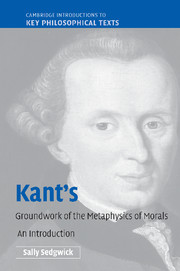Book contents
- Frontmatter
- Contents
- Preface
- List of abbreviations
- 1 Introduction
- 2 Kant's Preface
- 3 Section I: Transition from common rational to philosophic moral cognition
- 4 Section II: Transition from popular moral philosophy to metaphysics of morals
- 5 Section III: Transition from metaphysics of morals to the critique of pure practical reason
- Bibliography
- Index
3 - Section I: Transition from common rational to philosophic moral cognition
Published online by Cambridge University Press: 05 June 2012
- Frontmatter
- Contents
- Preface
- List of abbreviations
- 1 Introduction
- 2 Kant's Preface
- 3 Section I: Transition from common rational to philosophic moral cognition
- 4 Section II: Transition from popular moral philosophy to metaphysics of morals
- 5 Section III: Transition from metaphysics of morals to the critique of pure practical reason
- Bibliography
- Index
Summary
INTRODUCTION
The title of Section I
We saw in the final paragraphs of our previous chapter that Kant indicates that he will “proceed analytically” in Section I from a “common rational moral cognition” to the “determination of its supreme principle” (392). The “transition” Kant refers to in the title of Section I, then, is a transition from what he supposes is a commonly accepted concept – in this case, the concept of a good will – to the assumptions upon which that concept is grounded or based. The movement is regressive: from a conditioned concept to its conditions.
But what qualifies a cognition as “common,” on Kant's account? This question is especially pressing in light of the fact that, in Section II, he will insist upon distinguishing the “common” from the “popular” cognition of a good will. In our discussion of the Preface we learned that Kant is convinced that only the common cognition furnishes reliable insight into the concept of a good will. We will examine his reasons for this view in some detail when we turn, in the next chapter, to our discussion of the first paragraphs of Section II. For now, we need merely note that Kant seems to identify “common moral cognition” with something akin to moral insight or intuition. The popular concept of the good will is unreliable, in his view, because it derives its concept of duty from a different source, namely, from experience.
- Type
- Chapter
- Information
- Kant's Groundwork of the Metaphysics of MoralsAn Introduction, pp. 47 - 82Publisher: Cambridge University PressPrint publication year: 2008

